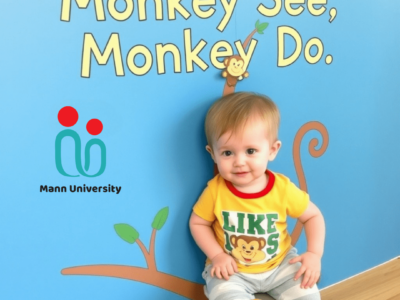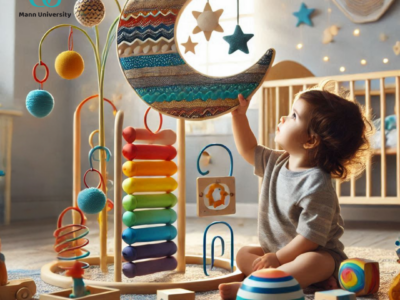Activities for 12-Month-Old Babies:
An Overview of Developmental Areas

A 12-Month-Old Baby’s Development: A Time of Remarkable Growth
A 12-month-old baby is a whirlwind of activity, curiosity, and rapid development. They are transitioning from babyhood to toddlerhood, and their newfound skills and abilities are a constant source of delight and wonder for their caregivers.
Overall, a 12-month-old baby is a bundle of energy and potential. They are learning and growing at an incredible pace, and their newfound skills and abilities are a constant source of amazement and joy for their caregivers.
Let’s Discuss all areas of development and different types of intelligence in detail.
Physical Development
- Gross Motor Skills: Most 12-month-olds can stand alone and may even take their first few steps. They are also likely to be able to sit down without assistance, crawl up stairs, and cruise along furniture.
- Fine Motor Skills: Their fine motor skills are also improving, and they can now pick up small objects using a pincer grasp (thumb and index finger). They may also be able to stack blocks, turn pages in a book, and scribble with a crayon.
Activities
- Crawling and Cruising: Encourage exploration of the environment through crawling and pulling up to stand. Set up obstacle courses with pillows and blankets.
- Walking: Assist with taking first steps while holding hands or using a push toy for support.
- Fine Motor Skills: Offer age-appropriate toys that promote grasping, picking up small objects, and stacking blocks.
- Sensory Play: Provide opportunities for exploration using different textures (e.g., water, sand, playdough) and temperatures.
- Object Permanence: Play peek-a-boo and hide-and-seek games to reinforce the concept that objects still exist even when out of sight.
- Cause and Effect: Introduce toys that react to actions, such as pop-up toys, stacking cups, or balls that roll down ramps.
- Exploration: Encourage curiosity by providing safe spaces for exploration and offering a variety of objects to investigate.
- Problem-Solving: Set up simple challenges, like reaching a toy placed slightly out of reach, to promote problem-solving skills.
Emotional Development
- Attachment: They have formed strong attachments to their primary caregivers and may experience separation anxiety when they are apart.
- Stranger Anxiety: They may also be wary of strangers and may cling to their caregivers when they are around unfamiliar people.
- Social Interaction: They are becoming more interested in interacting with other children and may enjoy playing alongside them, even if they don’t yet engage in cooperative play.
- Emotions: They are expressing a wider range of emotions, including joy, anger, sadness, and fear. They are also starting to understand the emotions of others and may try to comfort someone who is upset.
Activities
- Attachment: Foster a strong bond through responsive caregiving, cuddling, and reading together.
- Emotion Recognition: Label and discuss emotions during play and interactions, helping babies recognize and understand their feelings.
- Self-Regulation: Offer soothing techniques like gentle rocking or singing lullabies to help babies manage their emotions.
- Empathy: Encourage empathy by pointing out others’ emotions and modeling caring behavior.
- Mindfulness: Introduce simple mindfulness exercises, like observing nature or focusing on the breath, to promote inner peace.
- Gratitude: Express gratitude for everyday blessings and encourage babies to appreciate the world around them.
- Connection to Nature: Spend time outdoors, exploring natural environments and fostering a sense of wonder.
- Rituals: Create simple rituals, like bedtime prayers or blessings, to offer a sense of comfort and connection.
Linguistic Development
Their language skills are also blossoming, and they can now say a few words, such as “mama,” “dada,” and “bye-bye.” They also understand many more words than they can say and can follow simple commands, such as “give me the ball.”
Activities
- Talking: Engage in frequent conversations with babies, using simple language and responding to their babbles.
- Naming: Point out and name objects during play and daily routines, expanding vocabulary.
- Reading: Read books with colorful pictures and simple stories, emphasizing different tones and expressions.
- Singing: Sing songs and nursery rhymes with actions, encouraging babies to mimic sounds and words.
- Music and Movement: Play a variety of music and encourage babies to dance and move their bodies freely.
- Art Exploration: Offer non-toxic finger paints, crayons, and other art materials for open-ended exploration.
- Imaginative Play: Provide simple props like hats, scarves, or blocks to spark imaginative play scenarios.
- Storytelling: Create stories with babies, encouraging them to participate and add their own ideas.
- Modeling: Be a positive role model by demonstrating kindness, empathy, and respect towards others.
- Gentle Guidance: Use positive discipline techniques to redirect undesirable behaviors and teach appropriate actions.
- Sharing and Cooperation: Encourage sharing and taking turns through play activities and simple social interactions.
- Consequences: Explain natural consequences of actions in a gentle and age-appropriate way.
- Playdates: Arrange playdates with other babies of similar age to promote social interaction and sharing.
- Turn-Taking: Play games that involve taking turns, like rolling a ball back and forth or stacking blocks together.
- Imitation: Engage in imitative play, mimicking facial expressions and actions to foster social learning.
- Group Activities: Participate in group activities like music classes or story time to encourage interaction with peers.
- Expose to Diversity: Introduce babies to people from different cultures and backgrounds through books, music, and interactions.
- Celebrate Traditions: Participate in cultural traditions and holidays, sharing customs and values with babies.
- Learn a Second Language: If applicable, introduce a second language through songs, games, and simple conversations.
- Explore Art and Music: Share art, music, and dance from different cultures, fostering appreciation for diversity.
Course Features
- Lectures 270
- Quiz 0
- Duration 10 weeks
- Skill level All levels
- Language English
- Students 3
- Assessments Yes




